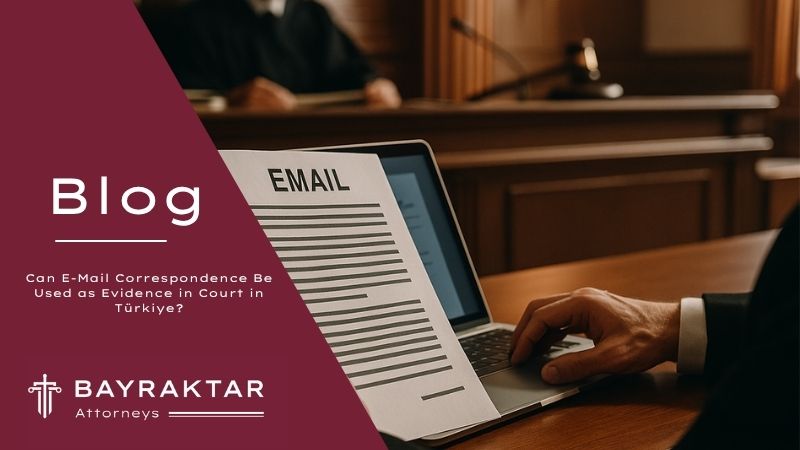
With the rapid expansion of digital communication, email correspondence has become one of the most commonly relied-upon forms of evidence in legal disputes. At Bayraktar Attorneys, a significant portion of both individual and corporate cases involves claims supported primarily by email communications. In modern commercial and personal relationships, many legally relevant statements, confirmations, and contractual negotiations are conducted via email rather than traditional written documents.
As a result, one of the most frequently asked legal questions is whether email correspondence can be accepted as evidence before a Turkish court. Under Turkish law, the answer depends on several legal and technical criteria, including the nature of the dispute, the content of the emails, and, most importantly, the lawfulness of how the evidence was obtained.

Legal Framework for Email Evidence in Türkiye
Email Correspondence Under the Turkish Code of Civil Procedure
The Turkish Code of Civil Procedure No. 6100 expressly recognizes electronic data as a valid form of evidence. Article 199 defines evidence broadly and includes documents created and stored in electronic environments. In the legal practice of Bayraktar Attorneys, email correspondence is frequently submitted as documentary evidence in civil and commercial proceedings.
Turkish courts do not exclude electronic documents solely because they exist in digital form. On the contrary, email communications are increasingly relied upon by courts, particularly in disputes arising from contractual and commercial relationships, provided that their authenticity and integrity can be established.
Contractual and Commercial Law Perspective
From a contractual standpoint, email correspondence is often used to prove offer and acceptance, amendments to agreements, notices of default, and termination declarations. Based on the litigation experience of Bayraktar Attorneys, Turkish courts carefully examine whether an email reflects the genuine intent of the parties and whether it constitutes a legally binding declaration of will under Turkish law.
In commercial disputes, especially those involving merchants, courts tend to interpret email correspondence in line with commercial customs, good faith principles, and established business practices.

Is Email Correspondence Considered Written Evidence?
Legal Classification of Emails
Whether an email qualifies as written evidence depends on its technical characteristics. If an email contains a secure electronic signature in accordance with Turkish legislation, it is legally treated as equivalent to a signed written document and carries strong evidentiary value before a court.
In practice, however, most email correspondence does not include a secure electronic signature. In such cases, emails are generally classified as discretionary evidence, meaning that the judge evaluates their credibility freely, together with all other evidence in the case file.
Evidentiary Value of Unsigned Emails
Even without a secure electronic signature, email correspondence may still play a decisive role in litigation. As frequently observed by Bayraktar Attorneys, courts assess factors such as consistency within the email chain, response timing, the relationship between the parties, and subsequent conduct following the correspondence. When supported by additional evidence, unsigned emails may be sufficient to prove critical facts before a court.
Lawful Acquisition of Email Evidence
Importance of Lawful Evidence Collection
One of the most decisive factors in determining whether email correspondence can be used as evidence is how it was obtained. Turkish law strictly prohibits the use of unlawfully obtained evidence, regardless of its relevance or probative value. A court is legally required to disregard evidence obtained in violation of fundamental rights.
Accessing another person’s email account without authorization, intercepting private communications, or obtaining emails through deceptive or unlawful means may result in the exclusion of the evidence and may also give rise to civil and criminal liability.
Data Protection and Privacy Considerations
Email correspondence often contains personal data and confidential information. Bayraktar Attorneys regularly advises clients that failure to comply with data protection and privacy regulations may seriously undermine the admissibility of email evidence. Even highly relevant email content may be rejected by a court if it violates privacy rights or personal data protection laws.

Use of Email Evidence in Different Types of Cases
Civil and Commercial Disputes
In civil and commercial litigation, email correspondence is commonly used to establish contractual obligations, payment claims, acknowledgments of debt, and breaches of contract. According to the case experience of Bayraktar Attorneys, Turkish courts generally accept email correspondence as evidence when its authenticity is not seriously disputed or can be verified through technical examination.
Employment Law Disputes
In employment-related cases, email correspondence plays a significant role in disputes involving termination, workplace instructions, overtime claims, and allegations of psychological harassment. Courts carefully balance the evidentiary value of emails against the employee’s right to privacy. Emails sent via corporate accounts for business purposes are more likely to be accepted as evidence before a court.
Criminal Proceedings
In criminal cases, the use of email correspondence as evidence is subject to stricter procedural safeguards. As emphasized in the criminal law practice of Bayraktar Attorneys, email evidence must be obtained in full compliance with criminal procedure rules, often requiring a judicial decision or prosecutor’s authorization.
How Turkish Courts Assess the Authenticity of Email Evidence
When the authenticity of email correspondence is disputed, the court may order a forensic examination. Based on the litigation practice of Bayraktar Attorneys, such examinations typically involve analysis of email headers, metadata, IP addresses, server records, and timestamps. Expert reports frequently play a decisive role in determining whether email correspondence can be relied upon as evidence.
If the opposing party acknowledges the content of the emails or behaves in a manner consistent with them, courts may accept the emails as valid evidence without the need for extensive technical analysis.
Recently Added Blogs




.png)
.png)
.png)
